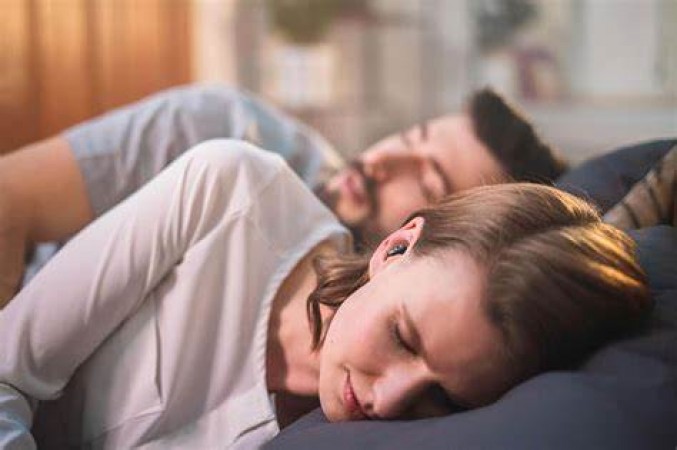
In the hustle and bustle of modern life, getting a good night's sleep has become a precious commodity. We all strive for those peaceful hours of slumber that can rejuvenate our bodies and minds. But what if the ambient noise around us is hindering our quest for a restful night? This is where the idea of wearing earplugs to bed comes into play. Let's delve into the pros, cons, and considerations surrounding this practice.
Modern living often exposes us to a barrage of sounds, from bustling streets to humming electronics. These noises can significantly disrupt our sleep cycles, leading to fragmented rest and groggy mornings. By wearing earplugs to bed, you can create a sound barrier that shields you from external disturbances. This can lead to longer periods of undisturbed sleep, allowing you to wake up feeling more refreshed.
When our sleep is interrupted by sounds, we may not enter the deeper stages of sleep crucial for our overall well-being. Wearing earplugs can help maintain a consistent level of quietness, enabling you to delve into those essential deep sleep phases. As a result, you're more likely to experience improved sleep quality, better mood, and enhanced cognitive function during the day.
While earplugs can be beneficial, some individuals might experience discomfort from prolonged use. Inserting foreign objects into the ear canal can lead to an unfamiliar sensation and potential soreness. It's essential to find earplugs made from soft and hypoallergenic materials to minimize any discomfort.
Regular use of earplugs may inadvertently lead to the accumulation of earwax. Earwax is a natural substance that helps protect the ear canal, but excessive buildup can cause discomfort and even temporary hearing loss. To prevent this, it's crucial to clean your earplugs regularly and practice good ear hygiene.
Foam earplugs are popular for their affordability and ease of use. They are designed to be compressed before insertion, allowing them to expand and create a seal within the ear canal. Foam earplugs are excellent for blocking out general noise and are often used by travelers and light sleepers.
Silicone earplugs are known for their durability and washability. They can be molded to fit the unique shape of your ear, providing a comfortable and effective seal against noise. These earplugs are great for those who need a customized fit.
Wax earplugs are pliable and moldable, making them a good option for individuals who find foam or silicone earplugs uncomfortable. They provide a snug fit and effectively reduce noise. However, they may need to be replaced more frequently than other types.
When selecting earplugs, prioritize comfort and material. Your earplugs should be made from hypoallergenic and non-irritating materials to prevent any adverse reactions. Comfort is key, especially if you plan to use them for extended periods.
Earplugs are assigned a Noise Reduction Rating (NRR) that indicates their effectiveness in blocking out noise. The higher the NRR, the better the earplugs are at reducing sound. Choose earplugs with an appropriate NRR based on your specific needs.
To prevent ear infections and other issues, it's crucial to keep your earplugs clean. Regularly wash and sanitize them according to the manufacturer's instructions. Clean earplugs not only provide better hygiene but also ensure their longevity.
Inserting earplugs properly is essential for both comfort and effectiveness. Follow the instructions provided with the earplugs to ensure they are placed correctly in your ears. A proper fit will create a seal that blocks out noise without causing discomfort.
Before making earplugs a regular part of your sleep routine, consider consulting a healthcare professional. They can examine your ears to ensure they are healthy and free from any issues that could be exacerbated by earplug use.
A medical professional can provide tailored advice based on your ear health and sleep requirements. They might recommend specific types of earplugs or alternative solutions if they believe earplugs could pose a risk or are unnecessary for your situation.
White noise machines emit a consistent sound that can mask external noises and help you sleep better. They create a soothing environment that promotes relaxation and drowns out disturbances.
Wireless earbuds designed for sleep often come with features like ambient sound modes or white noise playback. They are comfortable to wear and can be paired with soothing sounds to enhance your sleep experience.
In the quest for uninterrupted sleep, wearing earplugs can be a game-changer for many individuals. They provide a shield against noise disturbances, leading to improved sleep quality and overall well-being. However, it's essential to choose the right type of earplugs, maintain proper hygiene, and consult a medical professional if needed. Remember, the goal is not just silence but a restful sleep that leaves you energized for the day ahead.
How Our Body Clock Forms a Circadian Rhythm by Detecting Light ?
Indian ingredients: 5 Unexpected Ways Saffron Can Help Your Eyesight
Unveiling the Best Smart Rings: Features and Options Explored